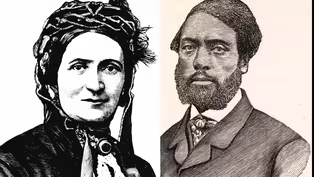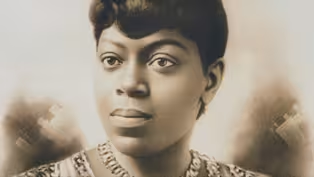
Green Seeker: All That Noise
Clip: Season 4 Episode 10 | 11m 1sVideo has Closed Captions
Noise pollution is more than just a nuisance. It’s also a public health issue.
From wailing ambulance sirens to bustling highways, the list of sounds heard on a regular basis is seemingly endless. It’s called noise pollution and experts say the problem has only gotten worse and little has been done to address it. Rhode Island PBS Weekly’s Michelle San Miguel talks with researchers studying noise pollution, as well as community members who are affected by it.
Problems playing video? | Closed Captioning Feedback
Problems playing video? | Closed Captioning Feedback
Rhode Island PBS Weekly is a local public television program presented by Ocean State Media

Green Seeker: All That Noise
Clip: Season 4 Episode 10 | 11m 1sVideo has Closed Captions
From wailing ambulance sirens to bustling highways, the list of sounds heard on a regular basis is seemingly endless. It’s called noise pollution and experts say the problem has only gotten worse and little has been done to address it. Rhode Island PBS Weekly’s Michelle San Miguel talks with researchers studying noise pollution, as well as community members who are affected by it.
Problems playing video? | Closed Captioning Feedback
How to Watch Rhode Island PBS Weekly
Rhode Island PBS Weekly is available to stream on pbs.org and the free PBS App, available on iPhone, Apple TV, Android TV, Android smartphones, Amazon Fire TV, Amazon Fire Tablet, Roku, Samsung Smart TV, and Vizio.
Providing Support for PBS.org
Learn Moreabout PBS online sponsorshipambulance sirens.
The list of sounds we hear on a regular basis is seemingly endless.
- It's called noise pollution.
It was first declared a public health hazard in 1968, but experts say the problem has only gotten worse and little has been done to address it.
Here in Providence, researchers at Brown University found the biggest contributor to noise in the Capitol City is transportation.
So how does the noise here compare to other cities in the region?
The answers will likely surprise you.
This report is part of our continuing Green Seeker series.
- On the weekends, it legitimately sounds like I live next to a racetrack, and it's not the interstate, it's the cars on Dean and Atwells.
- [Michelle] Frank Broome knew it would be noisy when he moved to Providence's Federal Hill Neighborhood.
(music blasting) But he says the sounds he hears from his apartment are louder than he imagined.
- I really never expected this, but there are cars that have speakers on the outsides of their cars and it's shocking how I'll hear not just bass, but I can hear clear lyrics.
- [Michelle] Over on the northeast side of Providence, Sam Howard is also frustrated.
- This is a lot of noise.
There's a siren going off right now.
We can hear vehicle noise happening late at night when folks are making their liquor runs.
We have a liquor store nearby.
People are chatting and yelling and playing music.
- He lives in the city's summit neighborhood less than two blocks from Miriam Hospital.
But the siren sound that we're hearing right now, that's pretty common around here?
- That, I mean, that's all day.
- [Michelle] Howard says he feels discouraged by the constant barrage of noise.
- It's often loud that I don't really want to be outside, right?
I'd rather be inside.
And I think that causes harm to social fabric.
I'm not running into neighbors as much as I should be.
- [Michelle] Both Howard and Broome invited students from a brown University research lab to measure the noise level for themselves.
Nina Lee has collected dozens of noise samples in Providence.
She sets up monitors and backyards and front porches around the city and leaves them there for a week.
- I would never be able to hear what you're saying, but I can see that for example, at 8:00 PM, there was a high burst of sound at a specific frequency.
- [Michelle] Erica Walker is the founder of Brown University's Community Noise Lab and an assistant professor of epidemiology.
- Sound is basically anything that you can process through your auditory system, anything that you can hear.
But when we move from sound to noise, we go from things that we like to hear to things that we don't want to hear.
- Walker is interested in how noise affects a community's health.
Before she moved to Rhode Island, she spent years monitoring and studying disruptive noises in Boston.
How noisy is Rhode Island compared to other places you've been like Boston specifically?
- Providence in particular is really loud.
It's on the lines of what I measured when I was in Boston.
- You're saying that Providence is as loud as Boston?
- Yeah.
- Really?
- Yes.
- [Michelle] Walker says it's no surprise that the biggest contributor to noise in the city is transportation.
From bustling highways to rumbling trains.
Research shows the neighborhoods most affected by noise pollution in Providence and across the country are communities of color and low-income residents.
Walker students have scoured locations all over the Capitol City and the state.
Their findings are being shared with local and state agencies.
Findings like this noise map that Walker and her students created for Providence.
Their measurements found upper South Providence and South Elmwood are the loudest neighborhoods.
Walker says those areas average 69 decibels.
That's close to the sound of a hair dryer, and louder than the city's limit for residential areas.
As for the quietest neighborhoods, that distinction goes to Blackstone and College Hill, which average 53 and 56 decibels, like the hum of a refrigerator.
While the sound of traffic may be expected in a city, Walker says it shouldn't be an issue that disrupts people's quality of life.
- We have this sort of misconception about noise, that it's a first world problem, that it's a sacrifice that you make to live in the city, that it's a sign of progress.
- [Michelle] Noise is more than just a nuisance.
Walker says it's also a public health issue and can trigger a person's fight or flight response.
- And that flight or fight response is preparing you for battle.
And can you imagine that if you're in a community where you're being prepared for battle every day, 24 hours a day, 365 days a year, what that does to your health over the long term?
- I don't know the exact terminology for it, but the cars when they drive, it sounds like gunshots.
- [Michelle] Frank Broome says the excessive noise off of Dean and Atwells has taken a toll on his health.
He works from home and says it can be difficult to get things done.
- I've started developing tinnitus in my ears, like I hear ringing in my ears constantly.
At first, I didn't realize the noise was affecting me that much, but there's a strong correlation where the noisier it is the less I'm able to do my job or be productive in general.
- [Michelle] According to the Environmental Protection Agency, noise pollution affects millions of people.
Studies show it can lead to high blood pressure, hearing loss, and sleep disruption.
Brown University student Chelsea Wang has studied the noise levels outside of hospitals and clinics.
She wants to learn how all of that outside noise affects patients inside.
We followed along as Wang set up a noise monitor by Rhode Island Hospital.
She wants to find ways to mitigate loud noise.
- We can have softer waiting rooms, for example.
We can isolate the front desk work from the work that goes on in a hospital.
- We know the public health implications of noise pollution.
People who have PTSD, people who are just trying to enjoy peace and quiet shouldn't have to deal with loud altered mufflers.
- [Michelle] Nearly two years ago, the Providence City Council passed a resolution asking city administrators to look into solutions to deal with excessive noise, including noise barrier tax incentives and acoustic cameras.
- It's really about protecting public health.
We're ensuring that we're improving quality of life for everyone in the in the city.
And that was the impetus.
- [Michelle] Councilman John Goncalves says he plans to introduce the idea of installing acoustic cameras in the city similar to what's been put up in Knoxville, Tennessee.
It would snap a picture of a vehicle when a sensor detects that noise levels are over the legal limit.
But he stresses that if cameras are installed, they would need to be rolled out properly.
- I don't think we'd be solving the problem in the most effective way if we just say "well, you know what?
The communities that are experiencing the most noise should have practically all of the acoustic cameras in the city".
I don't think that's fair.
And I don't think that's equitable.
We can't control everything, but if we do something, we can improve people's quality of life.
- It really does feel like this is the route that many people take to get from car horns honking, right?
- [Michelle] It's something that Sam Howard thinks about.
He wants to grow his family and would like the city to find ways to lessen the impact of noise on everyone.
- Do we put up soundproofing barriers?
Do we change the surfaces to make the roads less noisy?
There are a lot of solutions, and especially if we're thinking about climate change, a lot of the things we would do for sustainability go hand in hand with reducing noise.
And so we can do both together.
It's just a matter of priorities.
- [Michelle] Over on Federal Hill, Frank Broome says noise is a priority for him and it may force him off the hill.
- It feels like a slow buildup of noise and it affects me and my general anxiety levels.
- What would you say to people who hear this and say "oh Frank, you knew you were moving to a big city.
You're right off the highway.
You know that's gonna be a noisy area, if you're so annoyed by this, just move".
- Of course.
Even if let's say if and when I move, someone else is gonna move here and they're gonna have the same issues that I'm gonna be facing.
So even if I have the ability to move out of here, someone else is gonna be in the exact same situation that I am, and it's not fair to them as well.
Video has Closed Captions
Clip: S4 Ep10 | 9m 51s | Slaves William and Ellen Craft’s dangerous journey to freedom in the mid-1800s. (9m 51s)
Video has Closed Captions
Clip: S4 Ep10 | 6m 57s | In-depth second look at iconic soprano Sissieretta Jones. (6m 57s)
Providing Support for PBS.org
Learn Moreabout PBS online sponsorship
- News and Public Affairs

Top journalists deliver compelling original analysis of the hour's headlines.

- News and Public Affairs

FRONTLINE is investigative journalism that questions, explains and changes our world.












Support for PBS provided by:
Rhode Island PBS Weekly is a local public television program presented by Ocean State Media

